SAMI
Published:2020-03-12 23:29:03 BdST
Bangladesh leads global organic textile production
FT ONLINE
After taking the global leading position in green RMG, Bangladesh has made significant progress in producing organic textiles receiving certifications for a record number of textile factories in a year.
According to the Global Organic Textile Standard (GOTS) latest report, Bangladesh topped the list of organic textile producing countries in terms of total numbers of GOTS-certified facilities in 2019.
As many as 505 Bangladeshi factories received the GOTS-certification last year. On the other hand, 438 and 396 entities were registered respectively from India and Europe in the same year.
Currently, Bangladesh has 1,194 organic textile facilities.
The number of facilities that received the GOTS certification grew by 35 percent to reach 7,765 facilities in 70 countries in 2019. The number was 5,760 in 2018.
Countries with the largest growth in GOTS-certification in percentage in 2019 were the Netherlands and Bangladesh, both above 73 percent, followed closely by Spain with a 71 percent growth and Turkey with 65 percent.
The top 10 countries in terms of total numbers of GOTS-certified facilities in 2019 were India with 2,411 factories, followed by Bangladesh with 1,194, Turkey with 858, Germany with 565, China with 448, Italy with 444, Portugal with 301, Pakistan with 276, USA with 147, and UK with 75 factories.
In 2019, Bangladesh topped the table of the United States Green Building Council (USGBC) report with 24 platinum-rated LEED (Leadership in Energy and Environmental Design) factories.
Sayeed Ahmed Chowdhury, general manager of Square Denim, said: "Globally, buyers are concerned over source of their fashion items and want to make sure those are produced from a reliable source of organic cotton, as they are paying high for that."
"Textile producers are having such certifications over the last ten years for their spinning units. Buyers are also paying at least 5 percent higher for such products. Our company has been producing about 15 percent organic products of its total production capacity," he added.
Claudia Kersten, managing director of GOTS, said, "This enormous growth shows that GOTS successfully serves as a sustainable solution for certified organic fibre and finished product."
"With more and more GOTS-certified operations and products, we altogether substantially contribute to the sustainable development," she said.
The GOTS is a stringent voluntary global standard for the post-harvest processing of home textiles and apparel made with certified organic fibre and includes environmental and social criteria.
The organisation has been providing certificates to organic textile producers. Textile processing, manufacturing and trading entities can get this certification.
They also conduct audits every six months.
The GOTS certification helps to ensure compliance with each of the 17 UN Sustainable Development Goals.
There were more than three million workers in GOTS-certified facilities in 2019.
The GOTS also revised its standards last year to set a new version known as "GOTS Version 6.0", which is scheduled for launch in spring 2020.
Its key provisions include a ban on the use of genetically modified organisms, highly dangerous chemicals, and child labour, while requiring strong social compliance management systems and strict wastewater treatment practices.
The GOTS was developed by leading international standard setters - Organic Trade Association, USA, Japan Organic Cotton Association, International Association Natural Textile Industry, Germany, and Soil Association, UK to define globally recognised requirements that ensure the organic status of textiles, from field to finished product.
Unauthorized use or reproduction of The Finance Today content for commercial purposes is strictly prohibited.


